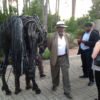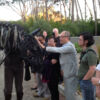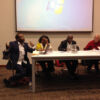Stellenbosch, South Africa, 18-20 October 2014
The CHR at UWC is affiliated to the Consortium of Humanities Centers and Institutes (CHCI). As part of an ongoing effort to expand its international network of humanities centres and institutions, the CHCI held a special meeting for invited guests in October 2014 at the Stellenbosch Institute for Advanced Study (STIAS), South Africa, on the theme of the dynamism of the humanities in contemporary Africa. The CHCI International Advisory Board and 17 invited guests (mostly humanities scholars and practitioners based in Africa) came together in this closed meeting over two days to discuss four general topics and other general themes and issues. Guests include scholars and practitioners in the fields of history, sociology, African studies, arts, literary writing, music composition and performance, education policy, and grant making.
This meeting in Africa continued the CHCI’s ongoing internationalisation efforts to humanities centres and institutes that began several years ago at the Rockefeller Center in Bellagio, where it reached out to potential European members and affiliates, and then continued in Hong Kong and Macau, where it worked with Asian institutions.
Part of CHCI’s outreach effort is to understand, and be sensitive to, regional conditions that affect the research, production, and shape of the humanities. To that effect, four topical panels were developed to ground conversation in the humanities in contemporary Africa. In one panel, it was asked how Africa’s continental specificities affect our understanding and research of the humanities. Another panel asked guests how the humanities influence the public. The third panel turned this around and asked how concrete projects, such as the African Library project and the Tombouctou Manuscripts Project, craft new directions for the humanities in Africa. The final panel brought our scholarly conversations to the book, Theory from the South (Comaroff and Comaroff, 2012). The book makes the case that theories developed in the “North” and applied to Africa can actually be seen as being derived from practices that were first discerned in Africa. The meeting, which the CHR helped to organise, brought this conversation back to South Africa in order to assess how other African humanities scholars and practitioners respond to the book’s claims.
Gallery




